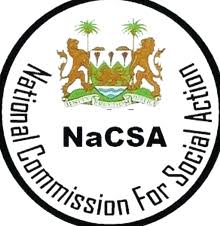By Lawrence Williams
The National Commission for Social Action (NACSA) finds itself under scrutiny in the 2022 Auditor General’s report. The report highlights a contract awarded for the construction of RC Primary School in Tihun Village which had seen significant delays and abandonment by the contractor.
According to the report, the contract awarded on 3rd December 2021 for a cost of SLE1,956,083 (1.9 billion old leones) was supposed to be completed by June 2022. However, as of the time the audit team visited the construction site on 25th September 2023, the construction works had not been completed. The contractor had allegedly abandoned the site due to a lack of funding to continue the construction works.
The consequences of the incomplete project, the auditors noted, were felt directly by the school pupils, particularly those in classes four, five, and six. With the permanent school building demolished to make way for the new structures, students were now forced to use makeshift zinc structures as classrooms. This makeshift arrangement poses significant challenges, especially during heavy rainfall, when classes had to be halted due to the rains and heavy winds, the report said.
Furthermore, the report reveals that from payments totaling SLE890,505, SLE47,766 representing 5.36% was meant for the supply of furniture. However, the furniture had not been supplied to the school as required. As a result, students in the affected classes were subjected to an adverse learning environment, which greatly impacted the quality of education they received.
The report underscores the accountability and transparency issues surrounding the management of public funds. Payments were made for works that were not performed and furniture that was not delivered, resulting in a loss of public funds.
In response to these queries, the NACSA management said the contractor had requested a 25% increase in project costs due to the rapid escalation in construction material and transportation costs. They stated that the project team had written to the National Public Procurement Authority (NPPA) seeking approval to request funds from the Ministry of Finance to cover the requested variance. In addition to that, the management said they had had meetings with the contractor to urge them to resume work while awaiting approval from the NPPA.
However, the auditors cast doubts on the actions taken by the NACSA management. The report notes that correspondence seeking approval for a review of contracts affected by the rise in material costs was submitted more than 12 months after the expiration of the contract. The report also points out that the documentary evidence requested, including action taken for the completion of the school reconstruction and furniture delivery, was not submitted, leaving the issues unresolved.
The report also highlights shortcomings in other NACSA projects. The construction of a grain store in Gandorhun Village, Niawa Chiefdom, Kenema district, was found to have several defects, including the omission of hardboard for the ceiling and failure to tile a floor as stipulated in the contract. Similarly, a defective water tank in the plumbing installation of a school in Gbinka, Jahn Chiefdom, Kailahun district, remains unaddressed.
With these findings, the Auditor General recommends that the NACSA Commissioner ensures the contractor fulfils the terms of the contract. The report also calls for action to rectify the defects identified and for evidence of these actions to be submitted for further audit inspection.
Additionally, the auditors uncovered several construction flaws and other issues at the Cocoa and Coffee Processing Centre (CCPC) in Gbeika, Kailahun district. The centre, funded by the German Pro-Poor Growth for Peace Consolidation (GPC), faced numerous challenges that have raised concerns about its effectiveness and functionality.
During a physical verification on 28th September 2023, the audit team discovered several shortcomings. Firstly, a 5,000 litre water tank was found to be defective and leaking after its installation. Additionally, the hand-dug water well, which is crucial for water supply, was not constructed to the required depth. As a result, muddy water continuously flowed out when the hand pump was used.
Further inspection revealed that the floor of the fermentation room did not have the necessary sloping to allow the cocoa slime to flow out. This led to the accumulation of slime on the floor, impacting the hygienic conditions. Moreover, a key component, the concrete suspended slab that should support the fermentation boxes, was not built despite being included in the cost estimates.
In addition to the construction flaws, concerns were raised during interviews with key officials at the CCPC. It was noted that while a generator had been provided and the centre electrified, the constant rise in fuel prices made it economically non-viable to continue using the generator. The wooden dry floors, which were meant to meet certain standards, were also deemed inadequate. Furthermore, a machine dryer, vital for effectively drying the cocoa, was not provided.
As a result of the findings, the auditors made several recommendations to address the issues. These included replacing the defective water tank, properly digging the water well to the required depth, constructing the suspended slab for the fermentation boxes, ensuring the sloping of the fermentation room floor, and resurfacing the concrete pavement to cover cracks. The auditors also requested evidence of the actions taken to be submitted for further inspection.
In response to the recommendations, the management provided counterarguments. They claimed that the water tank was not defective, as their technical team had tested it before making the final payment to the contractor. They also stated that the depth of the water well was done appropriately based on soil strata and the water table, though concerns were raised about the proper depth. Regarding the floor of the fermentation room, the management said that it was already constructed and slabbed before the sloping requirement was requested. They also mentioned that the concrete suspended slab and machine dryer were not covered in their contract agreement.
The auditors, however, expressed professional scepticism about the management’s responses, as their physical inspection contradicted the management’s claims. The unresolved construction flaws and issues highlighted by the audit team have raised concerns that the management might not take appropriate action to address these issues, ultimately affecting the functionality and satisfaction of the beneficiaries of the cocoa & coffee processing centre. The report emphasises the need for effective oversight and the proper use of public funds to ensure that projects are completed on time and according to specifications. Failure to address these issues can lead to the loss of public funds and negatively impact the lives of the communities they are intended to benefit.




